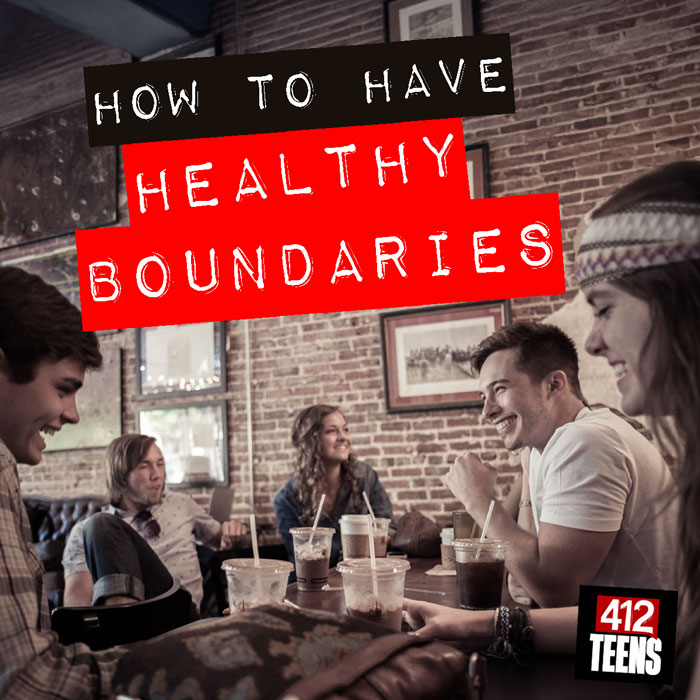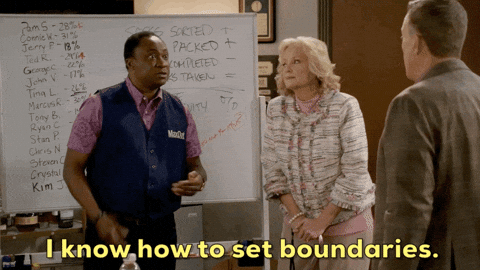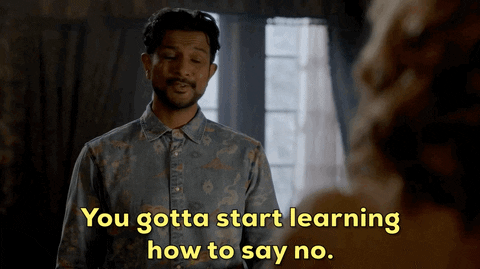How can I have healthy boundaries?

Do you feel like people constantly walk all over you? Or like you don't have a voice? Do you feel controlled by others who are only looking out for their own interests? Are there people in your life who gaslight you or have toxic behavior? Are you a chronic people pleaser? If so, setting some healthy boundaries with others may help those relationships change for the better.
What are boundaries?
A boundary literally refers to a "dividing line" between two spaces of differing jurisdiction. When it comes to personal boundaries, the line marks the edge of the things you can control. On the other side of that boundary is what only others can control. For example, you don't have control over that person who said something awful to you, but you DO have control over your response to their words.
A healthy boundary has godly motivations, defines the personal responsibilities of each person (i.e. what they can control), and clearly states the consequence of will happen if someone tries to control something that isn't theirs to control.
We should not use boundaries to exclude people or cause intentional harm to others. Healthy boundaries protect yourself or someone weaker from potential harm—whether emotional, spiritual, or physical (Psalm 82:4). Each person is responsible and accountable to God for their own choices—not the choices of others (2 Corinthians 5:10). So it's important to examine our motivations and know where that line is.
Are boundaries biblical?
The Bible tells us that we ought to practice self-control rather than try to control others (Titus 2:12; Galatians 5:22-23). When we take responsibility for what we can control and set an expectation that others must control themselves, then we create an opportunity for growth and improved relationships.
Setting healthy boundaries can protect us by outlining a course of action to take if someone tries to manipulate or take advantage of us. When we set a boundary with someone, we're saying, "This is how I'm going to protect myself. If you cross my boundary, then X-consequence will happen."

Why do we need boundaries?
"Do not be conformed to this world, but be transformed by the renewal of your mind, that by testing you may discern what is the will of God, what is good and acceptable and perfect." —Romans 12:2
Creating boundaries can help protect us from sinful influences (2 Corinthians 6:14). Rather than allowing the world to change our behavior, we should strive for Christlike character (James 4:4; Matthew 7:1, 12). For example, someone might have a personal boundary for themselves to never engage in gossip.
When we create healthy boundaries, we can minimize the damage that others' destructive or evil actions can have on our lives. We can also help protect each other from harm. For example, an unmarried couple ought to set boundaries for physical intimacy in order to preserve their sexual purity.
Boundaries help us respect each other's differences while still seeing each other's worth. God uses boundaries to teach us to appreciate how people are unique—instead of getting annoyed or frustrated about differing opinions or personalities. Real friends share truth in love—even if it's not something we want to hear (Proverbs 27:6; Ephesians 4:15). When everyone is exercising self-control and respecting one another, we can all feel free to be ourselves.
Boundaries That Make You Feel Secure
"For God gave us a spirit not of fear but of power and love and self-control." —2 Timothy 1:7
The point of having healthy boundaries is to help protect you and make you safer than you were before. If a boundary doesn't accomplish that for you, then it may need to change. You don't have to "put up" with abusive behavior or disrespect. While we are called to be peacemakers and treat all people with kindness (Romans 12:18), we do not need to allow others to continually use and abuse us.
To be totally honest, holding boundaries can be a LOT of work. It can be a lot harder to enforce boundaries than it is to just let the other person control you. But you are a valuable human being who is worthy of respect and love. If someone refuses to acknowledge that, it's worth the effort to protect yourself from them.
Understand How a Boundary Would Work in Your Situation
Maybe you have a friend who often tells white lies, and it makes you uncomfortable. Maybe you have a sibling who won't give you enough personal space—despite you asking them to do so multiple times. Or maybe you feel your coach is being unnecessarily harsh on you specifically. Whatever's causing you stress due to a lack of self-control or a lack of awareness from others, clearly define what the problem is and explore why it bothers you. Which of your needs are being disrespected or ignored? What do you need to happen instead? What will you do if they choose not to respect your boundary? Will you be able to uphold that consequence if the time comes?
Let's say you have a friend who uses severe profanity and that goes against your personal convictions. Ask yourself what could change in your relationship with that friend that would make you feel safer around them. Before you start a conversation with them, you'll want to be prepared to clearly communicate:
- What exactly is bothering you.
- Why this bothers you.
- What steps you will ask your friend to take so your relationship can improve.
- What steps you will take if your boundary is crossed.
Figure those things out ahead of time so that you can discuss how you feel and what you need with the other person. Talk to God about this conversation and your needs (James 1:5). You may even want to seek counsel with a loved one, your pastor, or a counselor to figure out the details and prepare how you'd like to that conversation to go (Proverbs 15:22). It might even be helpful to write out what you're going to say.

The Boundaries Conversation
Whenever you're talking to someone about establishing boundaries, choose a time that's not emotionally charged and approach them in a loving and respectful way (1 Peter 2:7; 1 Corinthians 13:4-7). Don't go into the conversation unprepared. Clearly explain why you need them to respect your boundary—and what the consequence will be if they don't.
Some people may not respond well to this kind of conversation no matter how much you prepare. They may not be in a place where they're prepared to recognize issues or make changes to their behavior. They may think you're being "mean" by setting boundaries because they don't want to lose the perceived control they thought they had over you.
If you're doing your best to be respectful and loving but firm, then you've done everything you could have done. Remember, you can't control how they will respond, and that's OK. YOUR boundaries are about YOUR needs—not theirs.
Sadly, I've had more than a few instances in my life in which I have walked away from close relationships due to crossed boundaries. It can be a very painful thing to end a friendship of many years. However, the only regret I have is not that the relationships ended, but the fact that I put off those conversations for too long. I could have prevented years of painful interactions.

Creating boundaries and sticking to them can be a particularly hard thing to do if we're coming from an abusive home environment—where disrespect, control, or manipulation was the "norm." It can be hard to recognize abusive behavior if that's all we've known. However, we should take steps to put an end to such cycles. As children of God, we are seen by Him as precious (1 Peter 2:9), holy (1 Peter 1:14-16), and co-heirs with Christ (Romans 8:17). As valuable and worthy human beings, we should not accept the mistreatment of others.
Boundaries aren't selfish when they help you love and serve others better. Galatians 5:13 reminds us that our freedom in Christ isn't for doing whatever we want—it's for choosing to love others instead of letting our selfishness and need for control to take over.
In healthy, godly friendships, both people can love each other and be themselves without having to control or manipulate (Philippians 2:3). Ultimately, our identity in Christ (not our past or our trauma) defines our worth, and our new identity in HIM should be reflected and respected in all of our relationships.
"Above all, keep loving one another earnestly, since love covers a multitude of sins." —1 Peter 4:8
ALSO SEE:
- What does the Bible say about self-worth?
- How do I stand up for myself in a godly way?
- What are spiritual boundaries?
- What does the Bible say about dealing with toxic relationships?
- What should I do if I'm being bullied in school?
- What does the Bible say about respecting your parents?
- How can I honor an abusive parent?
- Is it wrong to be annoyed with people?
- What is gaslighting?
- What are some signs of spiritual abuse?


TL;DR
Healthy personal boundaries encourage personal responsibility and active self-control. Healthy boundaries have godly motivations and clearly state the consequence of will happen if someone tries to control something that isn't theirs to control. We should not use boundaries to exclude people or cause intentional harm to others. Creating boundaries can help protect us from sinful influences (2 Corinthians 6:14). Rather than allowing the world to change our behavior, we should strive for Christlike character (James 4:4; Matthew 7:1, 12). When we create healthy boundaries, we can minimize the damage that others' destructive or evil actions can have on our lives and protect each other. Boundaries help us respect each other's differences while still seeing each other's worth. When everyone is exercising self-control and respecting one another, we can all feel free to be ourselves. Ultimately, our identity in Christ (not our past or our trauma) defines our worth, and our new identity in HIM should be reflected and respected in our relationships with others.

Writer: Grace Murphy
Grace is a passionate writer and musician who desires to radiate Christ's light in a generation of teens and young adults navigating their life in a world of spiritual darkness. Recent founder of Christian rock band Lighthouse Saints, she desires to spread the message of God’s truth and love through her songwriting and voice! Grace is also an aspiring freelancer who has worked professionally in writing, editing, and social media content creation. In her free time, Grace enjoys meeting new people, reading lots of books, jamming out with her friends, and writing (sometimes overly dramatic) poetry.
